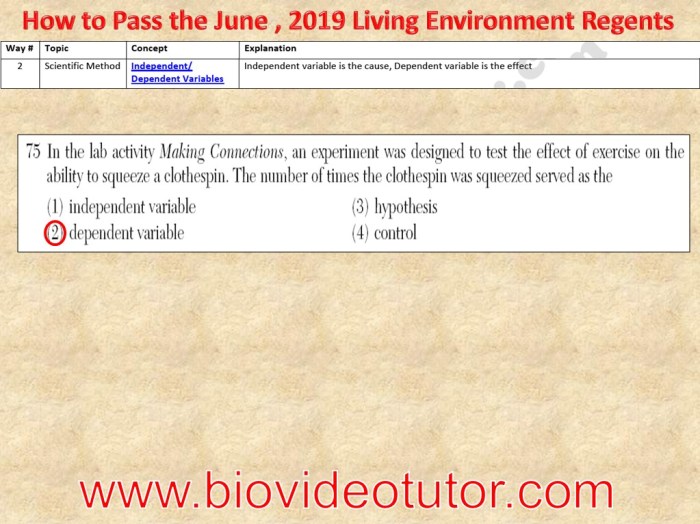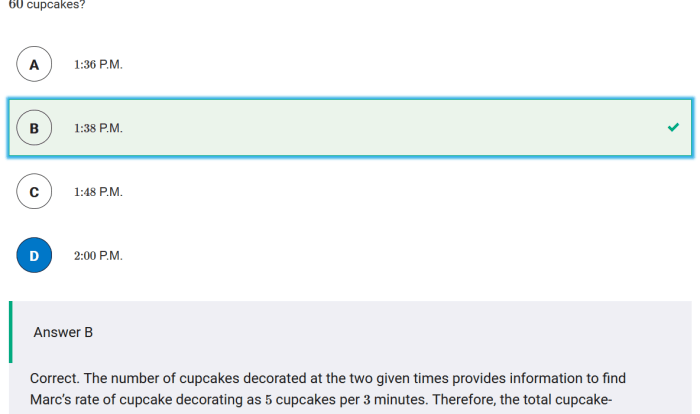The June 2019 Living Environment Regents exam is a crucial assessment for high school students in New York State. This comprehensive guide provides an overview of the exam structure, key concepts tested, and effective preparation strategies to help students excel in this challenging exam.
The exam consists of multiple-choice and open-ended questions that cover a wide range of topics in biology, ecology, and environmental science. Understanding the exam format and the specific concepts tested is essential for success.
Living Environment Regents Overview

The Living Environment Regents exam is a standardized test administered by the New York State Education Department (NYSED) to high school students who have completed a course in biology. The exam is designed to assess students’ understanding of the core concepts of biology, including ecology, evolution, and human biology.
The Living Environment Regents exam consists of 85 multiple-choice questions and 13 constructed-response questions. The multiple-choice questions are worth one point each, and the constructed-response questions are worth two points each. The exam is divided into three sections:
- Section 1: Ecology and Evolution(40 multiple-choice questions, 6 constructed-response questions)
- Section 2: Molecular Genetics and Development(25 multiple-choice questions, 4 constructed-response questions)
- Section 3: Human Biology(20 multiple-choice questions, 3 constructed-response questions)
June 2019 Regents Exam Specifics

The June 2019 Living Environment Regents exam was administered on Wednesday, June 19, 2019, from 9:15 AM to 12:15 PM.
This exam featured several notable changes compared to previous years:
Changes in the June 2019 Exam, June 2019 living environment regents
- Increased emphasis on scientific inquiry:The exam placed a greater emphasis on scientific inquiry skills, such as designing and conducting experiments, analyzing data, and drawing conclusions.
- New question types:The exam introduced new question types, including multiple-choice questions with multiple correct answers and open-ended questions that required students to provide detailed explanations.
- Revised content:The exam covered revised content, including new topics in ecology and evolution.
Key Concepts Tested

The June 2019 Living Environment Regents exam covered a wide range of content from the course. Students should have been familiar with the following major content areas:
The exam focused on the following key concepts:
Ecology
- Ecosystems and Communities
- Population Ecology
- Biodiversity and Conservation
- Environmental Issues
Molecular Genetics
- DNA Structure and Function
- Gene Expression
- Genetic Variation and Inheritance
- Biotechnology
Evolution
- Natural Selection
- Evidence for Evolution
- Mechanisms of Evolution
- Evolutionary History
Human Biology
- Body Systems
- Homeostasis
- Health and Disease
- Human Impacts on the Environment
Students should have focused their preparation on these key concepts and the specific topics that were covered within each area.
Exam Preparation Strategies

Effective preparation for the Living Environment Regents Exam is crucial for success. Here are some essential strategies to maximize your performance:
Review Course Materials
Thoroughly review all course materials, including textbooks, notes, and handouts. Focus on understanding the key concepts, definitions, and processes covered throughout the course. Create summaries, flashcards, or concept maps to reinforce your understanding.
Practice with Sample Questions
Practice is key to success. Solve sample questions and past exam papers to familiarize yourself with the exam format and question types. Analyze your answers to identify areas where you need improvement. Use these practice sessions to enhance your critical thinking skills and time management.
Time Management
Time management is crucial during the exam. Develop a strategy to allocate time wisely for each section. Use the first few minutes to scan the exam and prioritize the questions you will tackle first. Answer the easier questions first to build confidence and save time for the more challenging ones.
Understanding Key Concepts
Beyond memorization, it is essential to grasp the underlying concepts and principles of living environment. Understand how these concepts interconnect and apply them to real-world scenarios. This will help you analyze and interpret questions more effectively during the exam.
Sample Questions and Analysis: June 2019 Living Environment Regents

The June 2019 Living Environment Regents exam featured a variety of questions that tested students’ understanding of key concepts in the subject.
The following are some sample questions from the exam, along with an analysis of the concepts they tested and the strategies for answering them correctly:
Photosynthesis and Respiration
Which of the following is NOT a product of photosynthesis?
- Glucose
- Oxygen
- Water
- Carbon dioxide
Analysis:This question tests students’ understanding of the basic products of photosynthesis. The correct answer is (c) Waterbecause water is a reactant in photosynthesis, not a product.
Genetics
A pea plant with purple flowers is crossed with a pea plant with white flowers. The resulting offspring all have purple flowers.
What is the genotype of the parent plant with purple flowers?
- PP
- Pp
- pp
- Cannot be determined from the given information
Analysis:This question tests students’ understanding of Mendelian genetics, specifically the concept of dominance. The correct answer is (b) Ppbecause the parent plant with purple flowers must have at least one dominant allele for purple flowers to produce offspring with purple flowers.
Ecology
Which of the following is NOT a characteristic of a keystone species?
- Has a disproportionate effect on its ecosystem relative to its abundance
- Is often a top predator
- Can be a producer or a consumer
- Is always a large animal
Analysis:This question tests students’ understanding of the concept of keystone species. The correct answer is (d) Is always a large animalbecause keystone species can be any size.
Evolution
Which of the following is NOT a mechanism of evolution?
- Natural selection
- Genetic drift
- Gene flow
- Artificial selection
Analysis:This question tests students’ understanding of the mechanisms of evolution. The correct answer is (d) Artificial selectionbecause artificial selection is not a natural process.
Human Biology
Which of the following is NOT a function of the liver?
- Detoxifies the blood
- Produces bile
- Stores glucose as glycogen
- Produces red blood cells
Analysis:This question tests students’ understanding of the functions of the liver. The correct answer is (d) Produces red blood cellsbecause red blood cells are produced in the bone marrow.
Resources for Study and Practice

Preparing for the June 2019 Living Environment Regents exam requires a comprehensive approach that includes utilizing various resources to enhance understanding and test-taking skills. These resources serve as valuable tools for students to reinforce concepts, practice problem-solving, and build confidence in their preparation.
Websites
*
-*New York State Education Department (NYSED)
Provides official exam information, sample questions, and scoring guidelines.
-
-*Khan Academy
Offers free online video tutorials, practice questions, and personalized learning experiences aligned with the Living Environment curriculum.
-*Bozeman Science
Features engaging video lessons, practice quizzes, and animations to explain complex scientific concepts.
Textbooks
*
-*Living Environment
Biology (Regents Edition) by G. B. Johnson: A comprehensive textbook that covers all topics tested on the Regents exam.
-
-*Biology
A Human Approach by Miller and Levine: Provides a student-friendly and visually appealing presentation of biological concepts.
-*Campbell Biology by Jane B. Reece
A highly regarded textbook known for its detailed explanations and up-to-date information.
Practice Exams
*
-*NYSED Practice Exams
Available on the NYSED website, these official exams provide students with an authentic test-taking experience.
-
-*Princeton Review Practice Tests
Offer timed practice exams with detailed answer explanations and scoring rubrics.
-*Barron’s Regents Exams and Answers
Living Environment: Includes multiple practice exams, answer keys, and comprehensive review materials.
Benefits of Using Resources
*
-*Reinforces Concepts
Revisiting concepts through multiple resources strengthens understanding and retention.
-
-*Develops Problem-Solving Skills
Practice questions and exams help students apply their knowledge and develop problem-solving abilities.
-*Builds Confidence
Exposure to different question formats and testing environments enhances confidence and reduces test anxiety.
-*Identifies Areas for Improvement
Practice exams and assessments provide feedback, allowing students to identify areas where they need further study.
-*Simulates Test-Taking Experience
Official practice exams mimic the actual test format, preparing students for the exam’s pacing and time constraints.
Accessing Resources Effectively
*
-*Create a Study Plan
Allocate specific time slots for studying and using resources consistently.
-
-*Use Resources Regularly
Integrate practice questions, video lessons, and textbook readings into your study routine.
-*Review Regularly
Go over previously covered material to reinforce concepts and identify areas for further clarification.
-*Seek Help When Needed
Utilize teacher support, online forums, or tutoring services to clarify challenging concepts.
-*Stay Informed
Check the NYSED website and other reliable sources for updates on exam content and testing procedures.
By utilizing these resources and following these strategies, students can enhance their preparation for the June 2019 Living Environment Regents exam and increase their chances of success.
FAQs
What is the purpose of the Living Environment Regents exam?
The Living Environment Regents exam assesses students’ understanding of the core concepts in biology, ecology, and environmental science, and their ability to apply this knowledge to real-world situations.
When and where will the June 2019 Living Environment Regents exam be held?
The June 2019 Living Environment Regents exam will be held on June 19, 2019, at high schools across New York State.
What are some effective preparation strategies for the Living Environment Regents exam?
Effective preparation strategies include reviewing course materials, practicing with sample questions, understanding the key concepts, and applying them to real-world scenarios.

